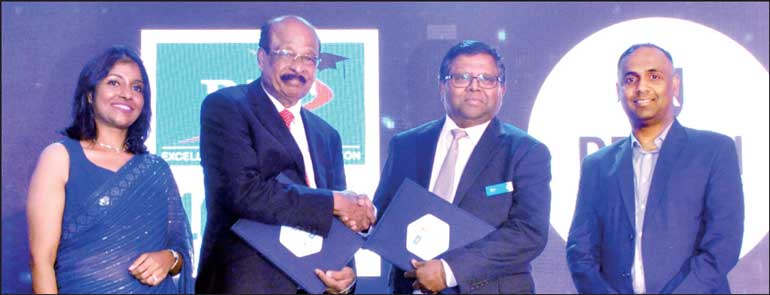Thursday Feb 19, 2026
Thursday Feb 19, 2026
Thursday, 17 August 2023 00:50 - - {{hitsCtrl.values.hits}}


By Divya Thotawatte
Royal Institute of Colombo (RIC) recently launched a licensed pathway to Deakin University (DU) Software Engineering and Data Science degrees with a promise of academic and professional success to its students.
Introducing the RIC-Deakin pathway program at the launching event held 14 August, DU Pro Vice Chancellor and International Research Partnerships and Associate Dean Prof. K Baskaran said, “Deakin University and Royal Institute of Colombo came together to provide quality higher education in Engineering and Data Science through this unique pathway program. It provides an excellent opportunity to move from teacher-centric secondary level education in Sri Lanka to learner-centric tertiary education in Australia.”
He listed the key aspects of the program as that students would be able to follow the same curriculum of DU with the support of the staff of RIC, students would be provided with similar infrastructure to those of the Australian university such as in terms of laboratories, and that depending on their area of study, students would study one/two years at RIC and then continue at DU to complete the degree.
Students in the pathway could save up to 60% of the tuition expenses of the Software Engineering degree and up to 40% of the tuition expenses of the Data Science degree in comparison to starting at DU directly.
Hence, the RIC-Deakin pathway program would provide students with an Australian university experience from Sri Lanka. This initiative is to ensure that there would be no gap in students’ learning outcomes, and they would arrive in Australia with similar academic learnings received had they started the same program at DU in the first year.
“The students will be made familiar with the university assessment methods and teaching methodologies, and also learn to become independent before they move to Australia,” Baskaran explained, highlighting that the students who follow the program would be ensured better employment and higher education opportunities.
Highlighting the significance of this collaborative pathway program in catering to the global market, RIC Academic Director Nirodha Bandara stated that the degree programs introduced also symbolised the intersection of knowledge and opportunity which propelled the students towards a future of growth, innovation, and impact.
DU School of Information Technology Centre for Cyber Resilience Director Robin Doss spoke of the Software Engineering and Data Science degrees offered by the pathway. Doss stated that the courses would help improve necessary skills that would benefit the careers of the students. “These were two courses that were developed by the School of Information Technology in response to the emerging areas and skill shortages that were observed in the industry, not just in Australia but also locally as we live and move to a world that is technology-driven, data-enabled and smart,” he explained.
Students following the Software Engineering degree would also gain a unique set of skills regarding driving cyber-physical systems that would make them stand out in the employment market. The students who follow the Data Science degree would also learn to drive transformation in different industries such as health, transport, finance, or education and obtain deeper insights into the optimisation of the uses of finite resources of nature.
Furthermore, students would learn to become one with a more intelligent world of Artificial Intelligence and machine-learning in a safe and responsible manner, Doss elaborated, stressing the abundance of career opportunities and skills received by the students of the degree programs.
“Maintaining relevance in an ever-changing global landscape is an important aspect of everyone’s lives,” said Virtusa former Chief Operating Officer and Global Business Leader Keith Modder, giving the keynote speech for the event. Being relevant to the customer is vital and also helps one/ a team develop a healthy curiosity of the future, while creating a culture of driving change and delivering results at the same time.
He stressed the importance of “keeping up to what is coming in the next year and being relevant to the next requirement of the next consumer” underlining how the leading companies today have risen through innovation and staying relevant by facing challenges to cater to and meet the demands of current consumers. Therefore, acquiring new skills is necessary to survive the ever-changing world of today.
- Pix by Lasantha Kumara